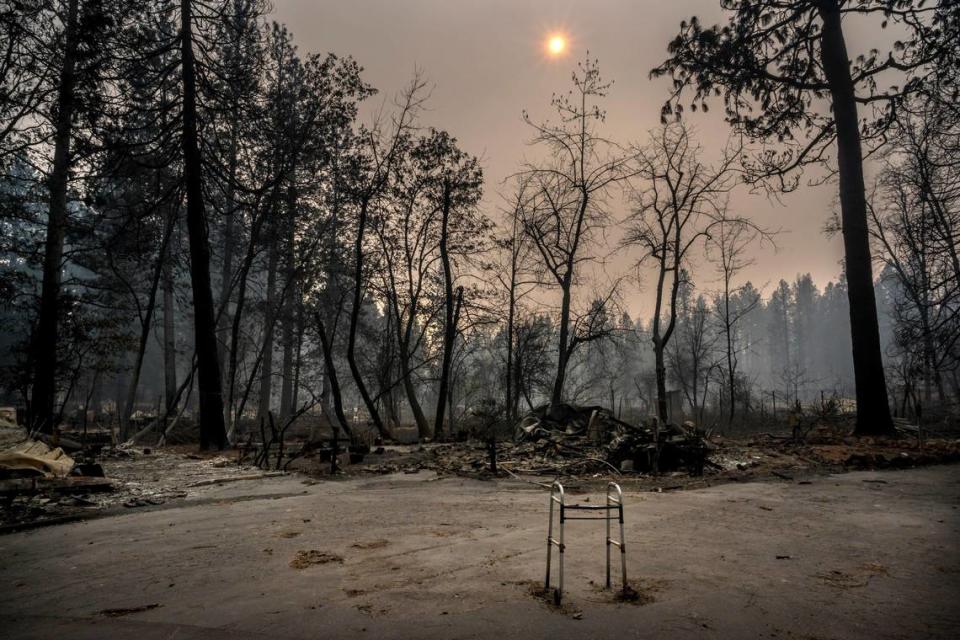Major insurer vows increase in California home policies if risk estimation rules change
Gerald Zimmerman, a government relations representative at Allstate, shared a bold claim during a public hearing Tuesday: If the Department of Insurance approves a series of rule changes, the company would end its pause on issuing new homeowner policies in California. And it would immediately start writing coverage again “in nearly every corner” of the state.
That statement came during a public hearing on one of those changes, which would allow insurance companies to estimate future risks when asking the department to increase prices.
Under the plan, companies will be allowed to use computer programs to predict losses from wildfires. Currently, insurers must anticipate catastrophic events by looking at the past 20 years. California is the only state that requires them to do so.
Company representatives have long argued that the state’s restriction is obsolete because it does not allow them to properly plan for future threats to homes due to climate change. And they have claimed it contributes to the decision of many insurers to limit or restrict new business in the state.
As a result, many homeowners are faced with prices that are rapidly increasing, and few alternatives other than the state-created insurer of last resort.
Zimmerman was one more than 30 speakers during the almost three-hour meeting hosted by the department to gather feedback on the draft rules.
Although he was eager to push the rules forward, many others were not. Some worried that the computer programs could overestimate risks, causing policyholders to pay more. Others expressed concerns the proposed changes would further delay how long it takes the state to approve rate increases.
Allison Adey, a lobbyist for the Personal Insurance Federation of California, said the draft rules create an onerous review process that could delay how quickly the computer programs could be used. They allow, for example, a department official to compel evidence and testimony.
Adey warned that without a specific timeline to evaluate the programs companies want to use, the vetting could go on for years.
“California consumers and insurers are suffering,” she said. “Quick action is needed to stabilize the market and increase insurance availability.”

Julia Borman, a regulatory manager at Verisk, a company that develops programs that estimate risks from catastrophic events, cautioned the proposal has “inadequate protections for intellectual property.”
The plan allows any person to be involved in the reviews. All participants must sign a nondisclosure agreement. But Borman said there should be limits on who is allowed to examine closely-held business information.
Consumer groups and individuals Tuesday advocated for the evaluations to be more open, in part, to better understand how the estimating tools affect prices.
Michael DeLong, an advocacy associate at the Consumer Federation of America, said “the rules for the use of catastrophe models must not compromise transparency and public scrutiny to preserve corporate secrecy.”
He said the organization was “surprised and dismayed” that the proposal did not call for the state to create a public computer program that insurers could use to anticipate wildfire risks.
Speakers also raised the concern that the draft changes would not go far enough to reward customers.
Bernard Molloy, fire chief for the city of Murrieta, near Riverside, wanted to make sure the computer programs will incorporate the work that cities and homeowners have done to protect their properties. That is not the case under the state’s current rules.
“If we do move to this model,” Malloy said, “we must be able to give some credit for those communities that have invested heavily in the wildfire mitigation efforts.”
The department is hoping to finalize its new rules related to the estimating tools before the end of the year.
After publication an Allstate spokesman in an email added to Zimmerman’s comments saying the company would sell more home policies in Californian once “home insurance rates fully reflect the cost of providing protection to consumers,” along with other changes the department is trying to make.

